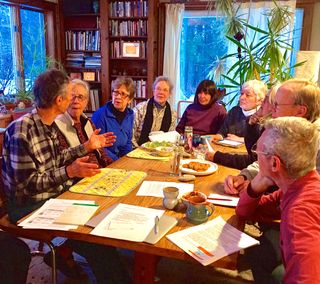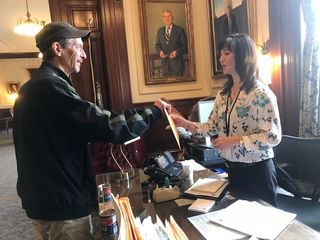Friends
How to Avoid a Personal Political Meltdown
Self-care is not enough.
Posted September 29, 2017
“I got into an email argument with my nephew about politics and wound up calling him a f------ moron. I can’t believe I said that. I apologized later. That’s not me.”
“I threw my shoe at the TV news last night, I got so upset. I can’t believe I’d do something like that.”
These are fraught times, aren’t they? These regretful comments by two friends of mine invite us to think about how we respond to the turmoil around—and within—us all. How to find a calm, hopeful place in these political times?
That’s Not Me
The current administration emphasizes “disruption” as a political tactic—intentionally creating uncertainty and confusion in the general population as a way of advancing its political agenda.
The effect on people is dramatic. The provocative, shrill tone of speeches, the constant barrage of outrageous, disorganized tweets combined with threats and intimidation, and the savage demeaning of opponents can indeed disrupt even the most seasoned veterans of political life, much less the rest of us. Veteran news anchors, political commentators, and late-night TV hosts have occasionally (to their subsequent regret) taken the bait and overreacted, responding in kind: nastily and without thinking. They have then made the same sort of abject apologies my friends conveyed to me: “I don’t know what happened,” “How could I have said that? That’s not me.”
That’s not me. Or at least not the calm, rational me. Our ability to think clearly gets muddled by the disruptive effects of primitive appeals to lash out, to become snide and bitter, to lose it in the face of the constant assaults on empathy, caring, and dignity going on around us.
Anxiety and depression are up. Friendships and family connections have frayed after bitter political disputes or in the attempts to avoid them entirely. And at the heart of it all is our sense of isolation, our loneliness, and fear
Self-care?
How do you protect yourself from the shock, the deliberate attempts to trigger your limbic system, bypass your prefrontal cortex, and ultimately disrupt the kind of calm that leads to a productive response to provocation?
You can turn off the TV, and pay less attention to the news. While helpful to a point, withdrawal also leaves a social and emotional void. We need concerned citizens, now more urgently than ever. Feelings of anxiety and depression among the population are early warnings that something is very wrong in our society.
You can demonstrate, go into the streets, you can sign Internet petitions and share posts on Facebook (also important and helpful, but limited). These ways of engaging can lead to more, not less, isolation. After the rally, you’re alone again. And when your connection to political action is primarily digital, you are—in Sherry Turkle’s poignant phrase—“alone together,” which means basically you are still alone.
I’d like to add to this list the importance of small, local, neighborhood groups as a support to our mental health and as a pathway to personally meaningful political action in these times. The “we” of a well-functioning small group grounds us, gives us a voice, provides courage and inspiration beyond what we can accomplish in our individual silos.
I know the value of such groups, as I am part of one.
The Thousand New Hampshire Living Rooms Project

We are a small group of neighbors in a small town in New Hampshire, who have developed a variety of ways to help people find their voices and become more involved in political action—even if they have never done so before. “Neighbors” isn’t quite accurate: when you live rurally the term encompasses a wide area. We are called “Monadnock United 2018” since we all live within a relatively short drive of Mount Monadnock in southwestern NH.
We first met in 2012 when six of us got together to discuss how to support President Obama’s re-election. We had little political experience but we wanted to figure out how to engage our neighbors and concerned citizens around the region. The group decided that the best way was to get people to sign something they believed in. So we agreed to write a newspaper ad listing the reasons why we were voting to re-elect President Obama and obtain as many signatures as possible from around the region.
Since what can reasonably fit on a one-page newspaper ad is limited (and costs money!), we had to talk and discuss exactly WHY we wanted to vote for our candidate. This took several meetings and involved considerable give-and-take. Creating the ad meant we had to really talk to each other and give voice to what most mattered to each of us. We disagreed, we talked, we compromised. And we created our ad together, drawing on the different talents in the group.
Then we needed to get people to sign the ad and donate money to publish it. We hoped to raise enough money for an ad in one of the local papers. We used email and word of mouth in our friendship networks. We reached out to people in what I have now learned is called “warm outreach”—personal and direct and based on the relationships we had where we lived and worked.
The result? Hundreds of people from all over the region signed the ad. We shot past our fundraising goal with enough money for ads in all four of our local newspapers. Many people thanked us for giving them a chance at a grassroots level to express their concerns.
We reunited for the 2016 election and applied what we learned in 2012. This time we focused on newspaper and radio ads for our presidential and senatorial candidates and we again reached out with email and direct conversations in a warm outreach way.
The result? Again, hundreds of signers. This time we raised double our much larger budgeted goal allowing even broader publication of our ads, in print, online, and radio versions. Hillary Clinton carried New Hampshire in 2016 by just 3,000 votes and now-Senator Maggie Hassan defeated the Republican incumbent by barely 1,000. However, in our area both she and Clinton won by wide margins. While our group can’t take all credit for that, we believe our efforts contributed substantially to their success
And, consider this: If now-Senator Hassan had lost to the lock-step Republican incumbent last November, today the Affordable Care Act would be history since the Republicans would have had just enough votes to overturn it. There is great power in small groups.
We are continuing now as Monadnock United 2018, looking toward organizing for the crucial upcoming midterm elections. We have already had some success in mobilizing opposition to (and in one case preventing passage of) several state bills threatening public education and voting rights. We have even produced a video on the role of public education in a democracy.

We’ve taken a letter signed by 500 New Hampshire voters directly to the Governor’s office, organized letter-writing campaigns to our senators and worked together on letters to the editor of our local newspaper on issues of importance to us. All this shows that there are many ways for people to get engaged at their comfort level and to find their political voice.
As part of the 1,000 Living Rooms Initiative, we are now actively encouraging more living-room groups to form around New Hampshire, and in other states. We’d welcome hearing from you if you are a looking for a group or are in a newly forming or existing group, anywhere in the country.
What We Have Learned
Living-room groups can provide important support and encouragement that enable us to take steps we might not if we were working on our own. We’ve also found that a trustworthy group that meets regularly is an important antidote to the “engagement fatigue” that may come from the many struggles and protests that lie ahead. While we don’t devote extended time anymore to processing our sense of grief and sadness, as we did immediately post-election, the group does provide an important place for us to feel less alone and to feel heard in the face of distressing new headlines.
Creating a stable, trustworthy small group takes some work. If groups try to accomplish too much, too fast, members may become discouraged and drift away. Avoid immediately hurrying “to do something.” Take time to talk and get to know each other, and to discuss what really matters to each member. You may disagree—that’s fine—but it’s important that every member feel heard.
Over time the group will develop some initial goals. Start small: a letter to the governor or your senator or representative in support of an issue important to you (perhaps voting rights or public education or Planned Parenthood), or a very local issue. An early success is crucial to group morale. And gradually you’ll also need to develop at least an informal structure to clarify responsibilities, schedule meetings and the like. (You can find a more complete list of “how-to’s” and some tips here.)
Self-care v. collective care.
There is a lot of emphasis on “self-care” these days, but the real challenge is “collective care”—finding ways to support and help each other, to leverage our interdependence even though we are used to thinking of ourselves as “independent.” One positive outcome of these times may be that we learn to depend on each other more than in the past. There’ll be less “bowling alone.”
Finding or forming a small group is not easy. It means stepping beyond our comfort zone. It involves sending an email or calling up people, inviting them over, talking about issues we may not ordinarily talk about with neighbors or friends.
Here’s one way to broach the subject: “I’m concerned about what’s going on in Washington and here closer to home. I thought I might invite some friends over to talk about it all. Would you like to join us
When you imagine saying or emailing such an invitation, you may want to explore the feelings that come up. Probably there’s some resistance, or an urge to procrastinate, but also perhaps some curiosity and hopefulness.
Clearly, there are risks as well as rewards involved in turning to other people, hoping to find common ground amidst the strength of a small group.
It’s a lot better, though, than screaming at relatives or throwing your shoe at the TV. And it sure beats feeling worried and alone.
Sam Osherson, Ph.D., is a therapist in private practice in Cambridge, MA, and an Emeritus Professor of Psychology at the Fielding Graduate University. He consults to schools through the Stanley King Counseling Institute and his most recent book is The Stethoscope Cure, a novel about a psychiatrist and the Vietnam War.




